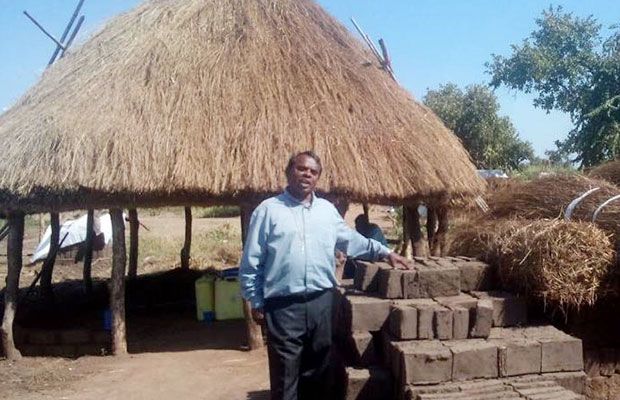
Rebuilding Lives in the Palabek Refugee Settlement
In February, we highlighted the early efforts of our missionaries serving in Uganda’s Palabek refugee settlement. In the few short months since, four Salesian priests have made remarkable strides: equipping residents to live dignified, productive lives both within, and eventually outside, the camp — through education, health and hygiene programs, social and pastoral care, and advocacy for basic human rights.
Currently, an estimated 41,000 South Sudanese refugees, 86 percent of whom are women and children, reside at Palabek, which is located just across the northern Ugandan border. Seeking relief from violence, drought and famine at home, the refugees “arrive practically without anything,” explains Father Lazar Arasu, the first Salesian missionary to serve there, and who now directs the Salesian programs provided throughout the camp. “These vulnerable people are hungry, thirsty, naked, sick, lonely … reaching out to them has been a moving experience for me.”
Fr. Lazar first visited the Palabek settlement in June 2017 on the Feast of Corpus Christi. There “out of curiosity,” he discovered a group of Christians praying under a large tree. When he offered to celebrate a proper Mass, they exclaimed, “It’s a miracle!” Word quickly spread among Catholics living in the settlement, who had longed for spiritual ministry for more than a year. Soon, Fr. Lazar was visiting every Sunday from his residence in Gulu, nearly 60 miles away. From August through December, a Catholic refugee named Eugene hosted Fr. Lazar in his small home. And then, in an act of remarkable selflessness, the community built Fr. Lazar his own little hut, where he has lived ever since.
Recalling this experience in an article for Leadership Magazine – Uganda, Fr. Lazar writes, “I consider this a special inspiration and call from God to exercise my priestly and pastoral ministry to the most vulnerable of the world today. Since the refugee population is dominated by young people, it is a way to express my Salesian vocation to serve youth in vulnerable situations.”
Now joined by Fathers Ubaldino Andrade, Albert Canisius and Reddy Papi Gade, Fr. Lazar and his fellow Salesian missionaries comprise the only humanitarian organization that maintains permanent residence within Palabek. Through this dedication, they have succeeded in winning the hearts, and trust, of the people whom they serve.
In addition to celebrating Sunday Mass in nine chapels throughout the refugee settlement, performing hundreds of baptisms, and preparing to administer additional Sacraments, missionaries provide clean water and improved sanitation facilities for residents. They also employ skilled workers from among the refugee population to help build chapels, schools and other facilities. This practice not only helps workers feel valued and useful, but also provides a decent salary with which they can purchase additional food and other necessities for themselves and their families. As part of this same effort, missionaries recently launched a “Learn as You Work” program that offers carpentry apprenticeship opportunities to young men as they participate in ongoing construction projects alongside their trained peers. The Salesians are also teaching many other refugees to grow vegetables, raise poultry, make soap and produce shoes. These income-generating skills also provide crucial resources for the broader refugee population.
And there’s more! Over 1,000 children now attend one of four Salesian-run nursery schools. Soon, a new vocational training center will offer courses in carpentry, masonry, knitting and child care. And missionaries have developed a variety of innovative programs and interventions to help refugees discover their hidden potential for promoting peace, dignity and socio-economic development. At a recent Leadership and Peace workshop, for example, youth from around the camp gathered to learn how they can become “change agents” in their country’s future — by first bridging the gap between themselves and their peers. Cultural activities, such as group singing and dance competitions organized by the Salesian community, further develop a sense of camaraderie among the young.
“Human life is not only food, clothing and shelter,” writes Fr. Lazar. “Refugees need security, education, psychosocial support and more to live a meaningful life. People have been reduced to zero. They have lost their homes, property, and above all their dear ones and their dignity as human beings.”
Thanks to four Salesian missionaries at Palabek, thousands of refugees are now beginning to rebuild their lives, and futures, from the ground up.
Our mission brings classrooms and other programs to refugee camps around the globe. What’s your mission?

